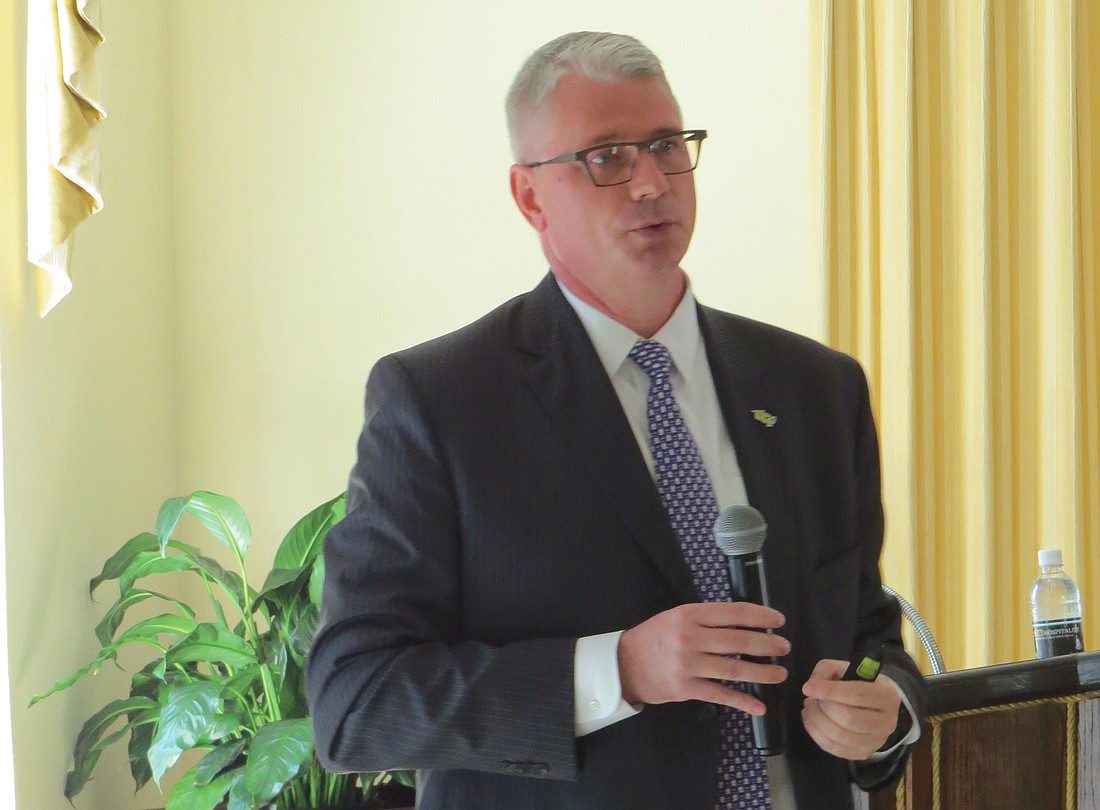
Call it “SkyMall” policy.
That was the analogy used by Sean Snaith, director of the Institute for Economic Competitiveness at the University of Central Florida, to describe the struggles the U.S. economy has endured since the beginning of the Great Recession and its sluggish, nine-year recovery.
Snaith spoke Tuesday at a luncheon meeting of the Jacksonville chapter of Commercial Real Estate Women at Epping Forest Yacht & Country Club.
He said SkyMall, the onboard airline magazine, had a penchant for overselling costly items that tended to not perform as promised.
Similarly, federal government programs and legislation — such as Troubled Asset Relief Program, Foreclosure Prevention Act of 2009, the American Recovery and Reinvestment Act of 2009 and the Affordable Care Act — overpromised and underdelivered, just as did the upright clothes steamer he said he purchased from SkyMall.
After 20 minutes of use, “I put on the suit and not only was it still wrinkled, but it was wet,” Snaith said.
A disappointing return on investment, the highest corporate tax rate among industrialized nations and over-regulation resulted in a lagging economic recovery, with a gross domestic product that has struggled to exceed 3 percent growth since the beginning of the recession, he told the CREW membership
“There has been no economic stimulus through much of the recovery,” he said. “It’s mostly been monetary policy and quantitative easing keeping things chugging along.”
An economist and part humorist, Snaith said the Trump administration’s “double-barreled” economic policy, combining infrastructure spending with tax reductions, should sustain, if not accelerate, the economic recovery for the next two to three years, and perhaps next year the U.S. will see GDP growth of more than 3 percent.
But don’t expect it to happen overnight.
He said the Trump administration’s proposed $1 trillion in infrastructure improvements, similar to the American Recovery and Reinvestment Act, isn’t a quick fix.
“The myth of the shovel-ready project was dispelled with that last plan,” Snaith said. “It takes time for that money to impact the economy. If by some miracle, tomorrow a trillion-dollar infrastructure bill was signed into law, we would not see any economic impact until late 2018.”
A more immediate impact would result from continued deregulation and the promised lowering of the corporate tax rate, he said.
“Regulations are like a tax. When you regulate something, you get less of that thing, which in some instances is good.” Snaith said. “I’m not suggesting regulations are bad, but when you foist regulations upon the economy, and we have been doing this for decades, there are costs associated with them and you have to weigh the costs against the benefit.
“Regulations are not imposed in a vacuum,” he said.
Snaith said a report he developed about regulations that have been imposed on American industry since 1949 suggest GDP growth is one-third of what it could have otherwise been.
“Regulation growth reduced real GDP growth by an average of 2 percent per year,” Snaith said. “That turns out to be significant when compounded. Real GDP growth was $15 trillion (since 1949). Without the regulations, it would have been $45 trillion.”
The administration’s plan to reduce corporate taxes would provide an additional boost, he said. American corporations now keep about $2.5 trillion in profits offshore. Should the corporate tax rate become more competitive, Snaith predicted much of those profits would return and immediately be invested.
“One thing companies do when they bring profits back is buy a new building and write that off immediately,” he told the room filled with commercial real estate professionals.
Deregulation and corporate tax cuts, combined with a reduction in personal income taxes, he said, would result in conditions ideally suited for economic growth.
“This could converge next year at a time when we see wages and salaries grow,” he said.
Global factors could adversely impact the scope of economic recovery, Snaith said. China, for example, is experiencing a debt bubble that could burst at any time.
“There’s never been a book written about a debt bubble that has the final line, ‘and they all lived happily ever after,’” Snaith said.
Europe’s economy remains unstable with immigration issues and as-yet unresolved economic crises in southern Europe set against the backdrop of Brexit.
“Those are things that could flare up,” Snaith said.
“The new administration has been interesting to say the least,” Snaith said, “but the key thing is what I have heard and seen thus far when it comes to the economy, the policy is the right path.”